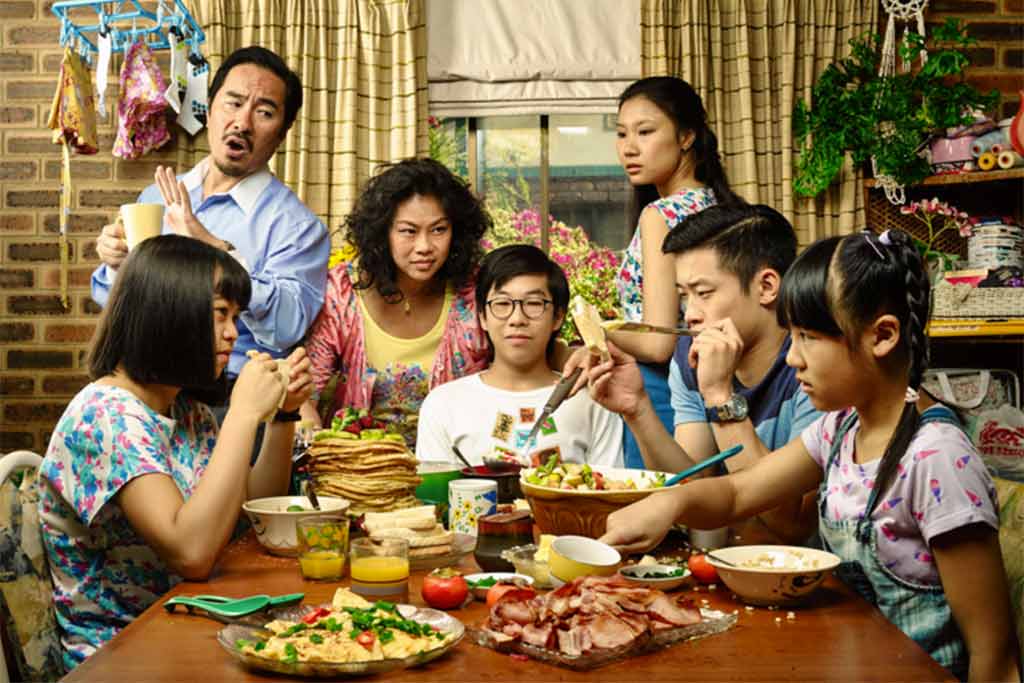‘The Family Law’ Is “Spreading Its Flaps” As One Of The Best Shows On Australian TV
Things are only getting better in season two.

The Family Law was a breakthrough production of 2016 and the first Australian series to star an entirely Asian main cast. This year the Laws are back, dealing with a broken home, new family members and a theatre tour, all with more ambition than ever. Vote 1 Benjamin Law for Middle School President!
When we last left them, the family was newly divorced (Danny and Jenny), newly engaged (Candy and Wayne) and having a big water fight to start off the summer. The season premiere brings us back in at Chinese New Year, an auspicious time of renewal that follows the lunar calendar and embraces a new animal to herald the New Year. 2017? Well that would be the Year of the Cock!
The first season of The Family Law was filled with heart-warming and hilariously relatable moments for Asian diaspora communities across Australia, and its renewal for a second season was music to my ears. The show’s truthfulness to the experiences of Asian-Australians has kept me on the edge of my seat waiting for this season premiere, and it does not disappoint.
Life With The Laws
As we dive back into the lives of the Laws, we’re confronted with the hellfire that is every teenager’s worst nightmare: the awkward braces phase. Ben (played by Trystan Go) is devastated with his new look, but Jenny Law (mother, and heart of the family) jumps straight in to comfort him, all while gratuitously snapping selfies with her kids on their first day back at school.
With her status as a newly divorced single mum, Jenny (Fiona Choi) looks to be carrying a considerable load of the tension this season, particularly in her efforts to both maintain and move beyond motherhood. Some of the most memorable and cringeworthy comedic moments of this episode are wrapped up in Jenny’s will to do anything to help her kids — even when it’s not wanted.

Jenny and Ben are also still grappling with their elite neighbours from across the way, who contrast the Laws ‘fresh-off-the-boat’ Chinese restaurant owner vibe with their upper-class mixed race family that are seemingly perfect at everything. Meanwhile, in the middle school presidential elections, Ben runs against Klaus (Takaya Honda), and the election seems to be harbouring some latent sexual tension.
The exploration of sexuality in a Chinese cultural context looks to be an exciting development for season two. Though The Family Law is groundbreaking by its nature alone — finally some Asian-Australians as leads on prime-time television! — the cultural significance of exploring queer identities in an Asian-Australian family context cannot be understated.
Conversations around sexual orientation and gender identity are often completely taboo in the Chinese community. A queer plotline in The Family Law has the potential to create a new and extremely necessary dialogue around LGBTIQ issues for many younger second generation migrant kids. The fact that Australian television’s first Asian family has explicitly queer characters at the centre of the show fulfils another level of representation that has been gapingly absent — that of queer people of colour.
The Power Of Proper Characters
For many Asian-Australians, representation in television has never been an accessible idea, let alone a possibility. Though Law’s storytelling completely breaks down type-cast Asian characters and delves into the universal issues faced by dysfunctional families, the detailed cultural references bring an incredible resonance too. To see an Asian grocery store as the setting for kids excitedly running around exclaiming over the haw flakes is anything but inconsequential.
Jenny, in particular, breaks stereotypes of Asian women as submissive, perpetually forgiving and uncomplicated people, as she struggles with a whole host of issues as a newly divorced mother. Jenny shows her jealousy, her disappointment and her conflict when faced with Danny’s (Anthony Wong) seeming success after leaving the family.
Creating deep and nuanced depictions of people of colour is more important than ever.
The classic Asian Aunties exacerbate this when they visit Danny’s new store with Jenny, and go on to call divorced women “left behind” and “discarded”, while fawning over the “successful business man”. These kinds of attitudes almost reward Danny for the complete lack of emotional labour and communication in his marriage (everyone remember when he called her “crazy” for wanting basic care and support?), but it’s an important mindset to interrogate on-screen.

Jenny is consistently categorised by Danny and others as too emotional, illogical or not thinking through her actions, and even Ben explodes over her emotional over-involvement. Jenny and Danny’s marriage parallels Ben’s own relationship with Melissa (Bethany Whitmore), where his reconciliation with her is aimed at his need for help in a self-serving bid for class president.
This examination of women and the men who never think to cater to their needs could have followed the age-old trope of mothers forgiving their spouses and capitulating to the needs of their family. In fact, a shot through the family window of Jenny forlornly folding clothes to a melancholy version of the theme song alludes to the constant matriarchal sacrifice expected of women in society. Surprisingly, instead, Jenny is surprised by the ridiculously loud firecrackers (set off by Ben) to signal the start of the Lunar New Year. With this symbolic new beginning she resolves to “spread her flaps” and find her own identity outside of being a mother.
In Australia’s current political climate — with the rise of One Nation, rampant racial abuse, and our xenophobic and damaging refugee policy — the work to deconstruct stereotypes and create deep and nuanced depictions of people of colour is more important than ever. The Family Law is giving us authentic, multi-dimensional and complex characters in a suburb on the Sunshine Coast, and though it might just look like a crazy family doing their best and making jokes about their genitals, it also feels a lot like progress.
–
The Family Law is on SBS Thursdays at 8.30pm. You can watch the first two episodes here.
–
Bridget Harilaou is a University of Sydney graduate with a single-minded passion for intersectional social justice and trouble-making (aka activism). She was the recipient of two New Colombo Plan scholarships to help build cultural understanding and ties with Asia.


